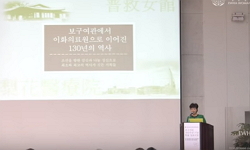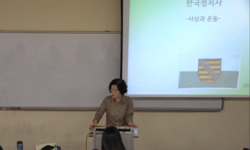This dissertation is a study of biographical and ideological disclosure. After an analysis of the author’s personal journey in the Korean student democratic movement, minjung theology, sangsaeng theology and tongil theology―all of them indigenous ...
http://chineseinput.net/에서 pinyin(병음)방식으로 중국어를 변환할 수 있습니다.
변환된 중국어를 복사하여 사용하시면 됩니다.
- 中文 을 입력하시려면 zhongwen을 입력하시고 space를누르시면됩니다.
- 北京 을 입력하시려면 beijing을 입력하시고 space를 누르시면 됩니다.
https://www.riss.kr/link?id=A104158701
-
저자
박삼경 (서울신학대학교)
- 발행기관
- 학술지명
- 권호사항
-
발행연도
2011
-
작성언어
Korean
-
주제어
한국 통일 ; 억압 ; 민중신학 ; 통일신학 ; 상생신학 ; 해방신학 ; 주체사상 ; 글리온회의 ; 통일윤리 ; Korean reunification ; Oppression ; Minjung Theology ; Sangsaeng Theology ; Tongil Theology ; Liberation Theology ; Juche Thought ; Glion Conference ; Reunification Ethics.
-
등재정보
KCI등재후보
-
자료형태
학술저널
-
수록면
149-172(24쪽)
-
KCI 피인용횟수
1
- DOI식별코드
- 제공처
-
0
상세조회 -
0
다운로드
부가정보
다국어 초록 (Multilingual Abstract)
The last chapter presents a short history of the reunification movement and the role of the Christian churches in it. It argues for a true open dialogue with North Korea that might well consider understandings emerging from their reality—such as juche—to be included in an ethics of reunification. The study asserts that reconciliation comes through the resolution of resentment or han. In the case of the divided Korea, communion consists in unity that respects diversity and results in minjok –one people. The understandings that emerge from the dialogue among the three Korean theologies and with the other liberation theologians considered enrich the theo-ethical basis for empowering the full participation of all Koreans in one society. In the end, an ethics of Korean reunification is not limited to political reunification, but seeks the construction of a new society in which all people will live together in a peaceful and just society. In the last chapter I examine one of the last documents and indicate how the three elements of the proposed ethics of reunification can further enhance the role of the churches in the reunification movement.
This dissertation is a study of biographical and ideological disclosure. After an analysis of the author’s personal journey in the Korean student democratic movement, minjung theology, sangsaeng theology and tongil theology―all of them indigenous Korean theologies—are analyzed in order to construct an ethics of Korean reunification. The meaning of liberation that emerges from minjung theology centers on an understanding of Korean liberation that includes full participation of all people in deciding the political and economic structures of a reunified Korean nation, and the creation of a society based on justice. I work with minjung theologians, Sun Nam Dong, Ahn Byung Mu, and Kim Yong-Bock. Sangsaen theology’s central concept, haewon-sangsaeng, makes clear that reunification means reconciliation and that to accomplish this Koreans must focus on resolution of accumulated resentment – han. I analyze the work of sangsaeng theologians, Park Jong Chun and Hong Jeong Soo. Toingil theology is about reunification. From the Christian point of view this means communion/community. I work with tongil theologians, Park Soon-Kyung, Moon Ik-Hwan, and Noh Jong-Sun. Reunification, therefore, is not to be left only in the hands of politician but it has to involve the Korean churches and the focus must be the creation of one national community. The discussion of these three Korean theologies is done using the work of Gustavo Gutiérrez, Ada María Isasi-Díaz, and Leonardo Boff.
The last chapter presents a short history of the reunification movement and the role of the Christian churches in it. It argues for a true open dialogue with North Korea that might well consider understandings emerging from their reality—such as juche—to be included in an ethics of reunification. The study asserts that reconciliation comes through the resolution of resentment or han. In the case of the divided Korea, communion consists in unity that respects diversity and results in minjok –one people. The understandings that emerge from the dialogue among the three Korean theologies and with the other liberation theologians considered enrich the theo-ethical basis for empowering the full participation of all Koreans in one society. In the end, an ethics of Korean reunification is not limited to political reunification, but seeks the construction of a new society in which all people will live together in a peaceful and just society. In the last chapter I examine one of the last documents and indicate how the three elements of the proposed ethics of reunification can further enhance the role of the churches in the reunification movement.
국문 초록 (Abstract)
본 논문은 신학-윤리적인 성찰들 가운데, 한국의 민중신학에서의 해방과 상생신학의 해원-상생, 그리고 통일신학의 공동체라는 개념을 남미의 신학-윤리학자들인 구스타보 구티에레쯔(Gustavo Gutierrez), 아다 마리아 이사스 디아즈(Ada Maria Isasi-Diaz), 그리고 레오나르도 보프(Leonardo Boff) 등의 이론들로 새롭게 조명하면서 21세기의 정의로운 평화의 조국통일을 이루기 위한 본질적인 통일윤리의 가치들로 해방과 화해, 그리고 새로운 일치를 위한 공동체(communion/community)등을 제안한다. 이러한 신학-윤리적인 성찰들은 한 민족의 새로운 통일공동체를 형성하는 데 있어서 모든 한국 사람들이 주도적으로 참여하는 데 있어 그 동인이 될 것을 보여준다.
본 논문 마지막 장에서 한국 통일운동의 역사를 짧게 살펴보고 한국 교회의 역할을 제시한다. 통일 운동사에서 남북한의 온전한 통일윤리를 향하여 북한의 주체사상을 어떻게 이해하는 것이 필요함을 알아본다. 끝으로 새로운 통일 윤리는 정의로운 평화가 되어야 한다. 통일윤리는 단지 정치적으로 남한과 북한을 하나의 나라로 통합하려는 것에 제한되지 않으며 보다 더 인간적인 정의롭고 평화로운 나라로 함께 서로가 상생할 수 있는 새로운 사회를 건설하는 것을 추구한다. 즉 분단과 분열은 곧 죄임을 기독교윤리의 관점에서 설명하고, 그 분단이라는 죄에서의 해방과 서로간의 치유와 화해를 통한 진정한 일치와 상생의 한 공동체를 이루는 것이 조국 통일운동에 있어서 교회의 역할이 되어야 한다는 것을 역사적인 기록물을 통해 살펴본다.
본 논문은 자서전적이고 이념적인 이야기로부터 시작한다. 한국의 통일윤리를 세우기 위해 학생 민주화운동에서 경험한 저자의 개인적이고 신앙적인 전이와 함께 한국 신학들인 민중신학...
본 논문은 자서전적이고 이념적인 이야기로부터 시작한다. 한국의 통일윤리를 세우기 위해 학생 민주화운동에서 경험한 저자의 개인적이고 신앙적인 전이와 함께 한국 신학들인 민중신학과 상생신학, 그리고 통일신학을 분석한다. 민중신학에 나타난 해방의 의미란 정의에 기초한 사회를 건설하는 것이다. 정의로운 평화로 통일된 국가를 이루기 위해 어떤 결정함에 있어서 모든 사람들이 참여할 수 있는 정치적이고 사회적인 구조를 창출하는 것이다. 민중신학자로서 서남동과 안병무, 그리고 김용복 등을 연구한다. 상생신학의 핵심개념인 해원-상생에 의하면 통일은 화해를 뜻하며 이는 분단으로 축척된 민족의 한을 푸는 것을 의미한다. 상생신학자로서 박종천과 홍정수를 연구한다. 통일신학에서 보면 통일이란 기독교적인 관점에서 다양성 가운데 일치를 추구하는 한 공동체를 이루는 것임을 알아본다. 통일신학자로서 박순경과 문익환, 그리고 노정선 등을 연구한다.
본 논문은 신학-윤리적인 성찰들 가운데, 한국의 민중신학에서의 해방과 상생신학의 해원-상생, 그리고 통일신학의 공동체라는 개념을 남미의 신학-윤리학자들인 구스타보 구티에레쯔(Gustavo Gutierrez), 아다 마리아 이사스 디아즈(Ada Maria Isasi-Diaz), 그리고 레오나르도 보프(Leonardo Boff) 등의 이론들로 새롭게 조명하면서 21세기의 정의로운 평화의 조국통일을 이루기 위한 본질적인 통일윤리의 가치들로 해방과 화해, 그리고 새로운 일치를 위한 공동체(communion/community)등을 제안한다. 이러한 신학-윤리적인 성찰들은 한 민족의 새로운 통일공동체를 형성하는 데 있어서 모든 한국 사람들이 주도적으로 참여하는 데 있어 그 동인이 될 것을 보여준다.
본 논문 마지막 장에서 한국 통일운동의 역사를 짧게 살펴보고 한국 교회의 역할을 제시한다. 통일 운동사에서 남북한의 온전한 통일윤리를 향하여 북한의 주체사상을 어떻게 이해하는 것이 필요함을 알아본다. 끝으로 새로운 통일 윤리는 정의로운 평화가 되어야 한다. 통일윤리는 단지 정치적으로 남한과 북한을 하나의 나라로 통합하려는 것에 제한되지 않으며 보다 더 인간적인 정의롭고 평화로운 나라로 함께 서로가 상생할 수 있는 새로운 사회를 건설하는 것을 추구한다. 즉 분단과 분열은 곧 죄임을 기독교윤리의 관점에서 설명하고, 그 분단이라는 죄에서의 해방과 서로간의 치유와 화해를 통한 진정한 일치와 상생의 한 공동체를 이루는 것이 조국 통일운동에 있어서 교회의 역할이 되어야 한다는 것을 역사적인 기록물을 통해 살펴본다.
참고문헌 (Reference)
1 이기백, "한국사 신론" 일조각 1999
2 김용복, "한국민중의 사회전기" 한길사 1987
3 이만열, "한국기독교와민족통일운동" 한국기독교역사연구소 2001
4 문익환, "통일은 어떻게 가능한가" 학민사 1984
5 박순경, "통일신학의 여정" 한울 1992
6 박순경, "통일신학의 미래" 사계절 1997
7 박순경, "통일신학의 고통과 승리" 한울 1992
8 노정선, "통일신학을 향하여" 한울 1988
9 민성일, "통일교실" 돌베개 1991
10 서남동, "전환시대의 신학" 한길사 1983
1 이기백, "한국사 신론" 일조각 1999
2 김용복, "한국민중의 사회전기" 한길사 1987
3 이만열, "한국기독교와민족통일운동" 한국기독교역사연구소 2001
4 문익환, "통일은 어떻게 가능한가" 학민사 1984
5 박순경, "통일신학의 여정" 한울 1992
6 박순경, "통일신학의 미래" 사계절 1997
7 박순경, "통일신학의 고통과 승리" 한울 1992
8 노정선, "통일신학을 향하여" 한울 1988
9 민성일, "통일교실" 돌베개 1991
10 서남동, "전환시대의 신학" 한길사 1983
11 안병무, "역사 앞에 민중과 더불어" 한길사 1986
12 홍정수, "상생신학:한국신학의 새 패러다임" 조명출판사 1992
13 박종천, "상생신학" 한국신학연구소 1991
14 홍정수, "베짜는 하나님" 조명문화사 1991
15 안병무, "민중신학이야기" 한국신학연구소 1988
16 서남동, "민중신학의 탐구" 한길사 1983
17 서남동, "민중과 한국신학" 한국신학연구소 1985
18 한완상, "민족통일과한국기독교" 한국기독학생회출판부 1994
19 문익환, "문익환 목사 전집" 사계절 1999
20 문익환, "목메는 강산 가슴에 곱게 수놓으며: 늦봄 문익환목사의 옥중서신" 사계절 1994
21 문익환, "두하늘 한 하늘" 창작과비평사 1989
22 한국기독교교회협의회통일위원회, "남북교회의만남과평화통일신학" 한국기독교사회문제연구원 1990
23 북미주기독학자회, "기독교와주체사상" 신앙과지성사 1993
24 이삼열, "기독교와 사회이념" 한국신학연구소 1986
25 안병무, "갈릴래아의 예수" 한국신학연구소 1990
26 Boff, Leonardo, "Trinity and Society" Orbis Books 1988
27 Noh, Jong-Sun, "The Third War" Yonsei University Press 2000
28 Gutiérrez, Gustavo, "The God of Life. Maryknoll" Orbis Books 1991
29 김동선, "The Bread for Today and the Bread for Tomorrow: The Ethical Significance of the Lord's Supper in the Korean Context" Peter Lang 2001
30 Hebermas, Ronald T., "Teaching for Reconciliation: Foundation and Practice of Christian Educational Ministry" Baker Books 1997
31 Buswell Jr., Robert E, "Religions of Korea in Practice" Princeton University Press 2007
32 Maduro, Otto, "Religion and Social Conflicts" Orbis Books 1998
33 De Gruchy, John W., "Reconciliation: Restoring Justice" SCM Press 2002
34 Isasi-Díaz, Ada María, "Reconciliation: A Religious, Social, and Civic Virtue" 2001
35 Kim, Yong-Bock, "Messiach and Minjung" Christian Conference of Asia 1992
36 Lee, Jung-Young, "Marginality: The Key to Multicultural Theology" Fortress Press 1995
37 Noh, Jong-Sun, "Liberating God for Minjung" Hanul 1994
38 Isasi-Díaz, Ada María, "La Lucha Continues: Mujerista Theology" Orbis Books 2004
39 Hart-Landsberg, Martin, "Korea: Division, Reunification, and U.S. Foreign Policy" Monthly Review Press 1998
40 Gardner, E. Clinton, "Justice and Christian Ethics" Cambridge University Press 1995
41 "Http://www.pcusa.org/worldwide/southkorea/kor_stmt.pdf"
42 "Http://www.kncc.or.kr/Data/BoardList.asp"
43 "Http://www.doam.org/archive/textea/kncc/role2007_leejaejoung_role_e.pdf"
44 Boff, Leonardo, "Holy Trinity, Perfect Community" Orbis Books 2000
45 Noh, Jong-Sun, "God of Reunification: Toward a Theology of Reunification" Yonsei University 1990
46 Park, Jong Chun, "Crawl with God, Dance in the Spirit" Abingdon Press 1998
47 Lee, Philip, "Communication, Reconciliation: Challenges Facing the 21st Century" WCC Publications 2001
48 Fuellenbach, John, "Church: Community for the Kingdom" Orbis Books 2002
49 Hoose, Bernard, "Christian Ethics: An Introduction" The Liturgical Press 1998
50 Kang, Wi Jo, "Christ and Caesar in Modern Korea" State University of New York 1997
51 Fabella, Virginia, "Asia's Struggle for Full Humanity" Orbis Books 1980
52 Gutiérrez, Gustavo, "A Theology of Liberation; The Power of the Poor in History" Orbis Books 1983
동일학술지(권/호) 다른 논문
-
- 서울신학대학교 기독교신학연구소
- 박창훈
- 2011
- KCI등재후보
-
성서신학 : “하늘”과 하나님의 나라 비유를 통해 본 하나님의 나라 -마가복음을 중심으로-
- 서울신학대학교 기독교신학연구소
- 김희성 ( Hee Sung Kim )
- 2011
- KCI등재후보
-
조직신학 : 존 웨슬리의 인간학 -하나님의 형상과 도덕법-
- 서울신학대학교 기독교신학연구소
- 김영택 ( Young Taek Kim )
- 2011
- KCI등재후보
-
조직신학 : 율법과 복음 -디다케, 바울, 예수의 이해-
- 서울신학대학교 기독교신학연구소
- 전성용 ( Sung Yong Jun )
- 2011
- KCI등재후보
분석정보
인용정보 인용지수 설명보기
학술지 이력
| 연월일 | 이력구분 | 이력상세 | 등재구분 |
|---|---|---|---|
| 2020 | 평가예정 | 신규평가 신청대상 (신규평가) | |
| 2019-12-01 | 평가 | 등재후보 탈락 (계속평가) | |
| 2017-01-01 | 평가 | 등재후보학술지 선정 (신규평가) |  |
| 2015-12-01 | 평가 | 등재후보 탈락 (기타) | |
| 2015-05-07 | 학술지명변경 | 한글명 : 신학과선교 -> 신학과 선교 |  |
| 2013-01-01 | 평가 | 등재후보 1차 PASS (등재후보1차) |  |
| 2011-01-01 | 평가 | 등재후보학술지 선정 () |  |
| 2009-06-03 | 학회명변경 | 한글명 : 목회선교연구소 -> 기독교신학연구소영문명 : Seoul Theological University -> Christian Theology Institute Center |





 KCI
KCI






